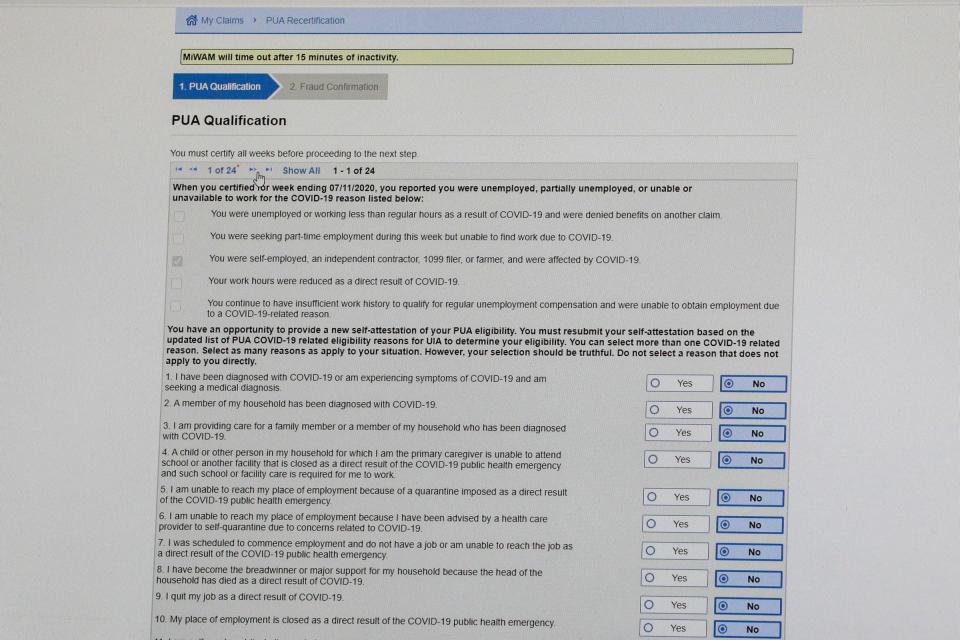Several Michigan unemployment insurance claimants file class-action lawsuit against agency
- Oops!Something went wrong.Please try again later.
Several Michigan unemployment insurance claimants who have received bills from the state saying they owe money back are suing Michigan's Unemployment Insurance Agency and its director Julia Dale.
Attorneys David Blanchard and Frances Hollander with the Ann Arbor law firm Blanchard & Walker said they filed a 37-page class-action complaint Friday in the Michigan Court of Claims, stating that the agency acted outside the law by determining claimants aren't eligible for benefits more than a year after benefits were paid.
"The agency is so clearly not following their own law, they're acting without jurisdiction, and acting beyond any statutory authority that they have," Blanchard said in an interview with the Detroit Free Press.
Nick Assendelft, a spokesperson for Michigan's Unemployment Insurance Agency, said the agency had no comment on the lawsuit. John Nevin, a spokesperson for the Michigan Court of Claims, said he has not seen the lawsuit and it may not be docketed until Monday.

Blanchard and Hollander are representing claimants Kellie Saunders, of Royal Oak; Erik Varga, of Gaylord; Lisa Shephard, of Coldwater; Dawn Davis, of Pinckney, and Jennifer Larke, of Whitmore Lake, all of whom have been assessed with "overpayments" and billed by the state for thousands of dollars.
For example, Saunders, a wedding and event photographer, applied for benefits at the start of the pandemic, and the agency determined she was eligible for $362 in benefits weekly in April 2020, the lawsuit said. In October 2021, the agency issued a "notice for redetermination" and said she should have been paid $160 instead. Saunders was told she was overpaid $14,000.
Another plaintiff, Varga, who worked in the hospitality industry and was laid off at the start of the pandemic, was told a year ago that the agency was seeking to collect $17,000 in benefits and that his federal income tax refund would be withheld, the lawsuit said. He protested, and despite his pending protest, his 2020 federal tax refund was garnished. He continues to get overpayment and garnishment notices even though his protest is still under review.
The lawsuit said the agency is violating the due process rights of Michigan residents granted under the state constitution by:
Undertaking collection activity, which includes seizing tax refunds, garnishing wages or withholding future benefits, based on "monetary determinations" issued more than a year after benefits were paid, which is a violation of the Michigan Employment Security Act.
Seeking recovery of overpayments that's required to be waived.
Engaging in collection activity without any final determination on the merits.
"Those who are just now recovering from financial hardship are facing unlawful seizure of wages and tax returns without any legal basis," the lawsuit said.
Blanchard said he has seen other cases of early collection activity from the agency, while claimants are still appealing or protesting an agency decision, but added: "It's just gotten to an outrageous level.
"What's different now is that you can't get a hearing for more than a year," he said.
More: UIA director hopes to provide guidance to Michiganders who received overpayment letters
More: Michigan Unemployment Insurance Agency paid up to $8.5B to fraudulent claims, report shows
At a joint Michigan House and Senate oversight committee hearing in Lansing earlier this month, Dale said she hoped to provide guidance to claimants who were retroactively deemed ineligible for benefits and are being asked to repay by the end of January.
When asked by the Detroit Free Press earlier this week about the status of waivers or options for pausing collections for claimants who have been told they were overpaid, Assendelft said: "We’re still working on next steps and are targeting the end of this month for a final determination on how we will proceed."
The plaintiffs are seeking monetary damages, preliminary and permanent injunctive relief, halting the garnishment and seizure of wages, and declaratory relief, which would require the agency to comply with its statutory and constitutional obligation to issue redeterminations within a year of the initial determination.
Contact Adrienne Roberts: amroberts@freepress.com.
This article originally appeared on Detroit Free Press: Lawsuit: Michigan's Unemployment Insurance Agency acted outside the law

